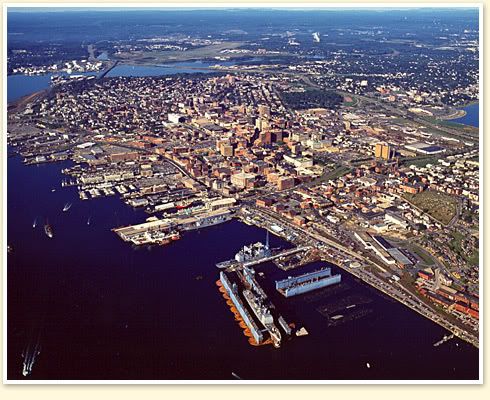 Beware, Portland: whatever is born of this process will determine the future of our waterfront. No matter which of the proposals currently before the council is adopted, both would spell the end of the working waterfront. Is that what we want? Perhaps, but we need to realize that that’s what we’re doing. Once one luxury hotel/conference center/boutique rack sits on the waterline, you can bet another will follow. It’s the small end of a wedge that could ultimately drive out the working waterfront zone.
Beware, Portland: whatever is born of this process will determine the future of our waterfront. No matter which of the proposals currently before the council is adopted, both would spell the end of the working waterfront. Is that what we want? Perhaps, but we need to realize that that’s what we’re doing. Once one luxury hotel/conference center/boutique rack sits on the waterline, you can bet another will follow. It’s the small end of a wedge that could ultimately drive out the working waterfront zone.The development of the pier is also an acid test for how seriously we take our commitment to sustainable progress. We need to get Portland out of its cars and walking. And we must guard against pricing ordinary Mainers out of the city. Development is necessary. But unless we carefully monitor the course and character of that development, we will find ourselves living in a generic commercial grayscape that puts profit before people. In doing so, we’ll have killed the goose that lays the golden egg.
The Olympia proposal is on the right track, and shines by comparison to Ocean Properties, but it needs to go further. I’m baffled by former Green Representative John Eder’s decision to act as window dressing for the Ocean Properties plan. There is very little that is truly “green” about it, other than Eder himself (pictured). Putting shrubbery on top of a parking garage is like passing out aspirin in a cancer ward.

These plans do not encourage increased pedestrian access, nor aid in the reduction of traffic. They do not maintain harmony with the ideal of a working waterfront. They do not address affordable housing at all. Instead, they pluck a piece of our bay away from us and use it to gild the lily of luxury.
Ask yourself, Portland, were you consulted about this? Or did this plan grow quietly in the dark of some city councilman’s office? Ocean Properties had a proposal ready very quickly. So quickly, in fact, that others have questioned the openness of the process and thereby, its integrity.
But Ocean Properties’ eagerness is perfectly understandable. Whatever they (or Olympia) do to the pier, they’ll hold the result rent free under a lease that lasts for generations. It’s a giveaway. I’d jump at it, too. That is, if I weren’t a tax-paying citizen of the City of Portland.
To be fair, the pier needs help in the form of expensive structural repairs. But that very fact highlights the shortcomings of years of city council policy which have failed to acknowledge that this day would come. To solve it, some propose to give it away.
The Maine State Pier belongs to you and me. It is an important piece of the public trust that we own by virtue of living in this city. Watch this closely, Portland. Be sure we get what we want, because this decision has the potential to shape the future of our skyline.
And since we’re on the subject of sustainable development and the privatization of public resources, it’s worth pointing out how our state legislature fell down on the job this week.
The Land for Maine’s Future program has been one of the most successful state land conservation projects in the nation. In a bond that has been consistently replenished since its inception, LMF has succeeded in setting aside over 400,000 acres for the people of Maine.
This land is our heritage. More importantly, as we negotiate our way into a new economy, it is also our brand. The genius behind the LMF money is that the state doesn’t give it out unless it can be matched by private funding. It’s a business-savvy strategy for leveraging our money to leverage our resources.
In a proposal that had the backing of people from former Governor Angus King to the Sportsman’s Alliance of Maine to municipal officials from across the State, the Governor asked for 35 million dollars in bonds (Hannah Pingree asked for 75 million--go Hannah!), spread over three years. Instead, our congress gave us less than half of that, in a one-time hit.
That’s not forward-thinking. That’s not preserving the best leverage our state has not only in the new economy, but also for the health of our selves and future Mainers. That’s half-a-loaf where more than just bread is needed. It’s a calculation based on buying votes rather than banking a resource for the future. As Beem said, “People come to Maine for from all over the world to experience the natural environment that has been plowed under, paved and developed where they come from.”
Whether you serve in City Hall or in the State House that’s a message you should bring into committee. And take to heart.
No comments:
Post a Comment